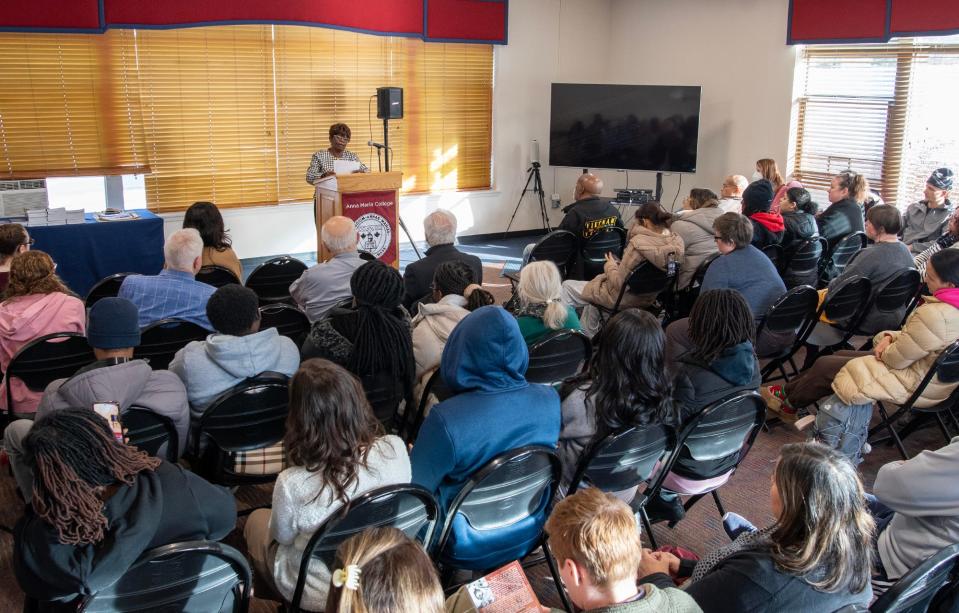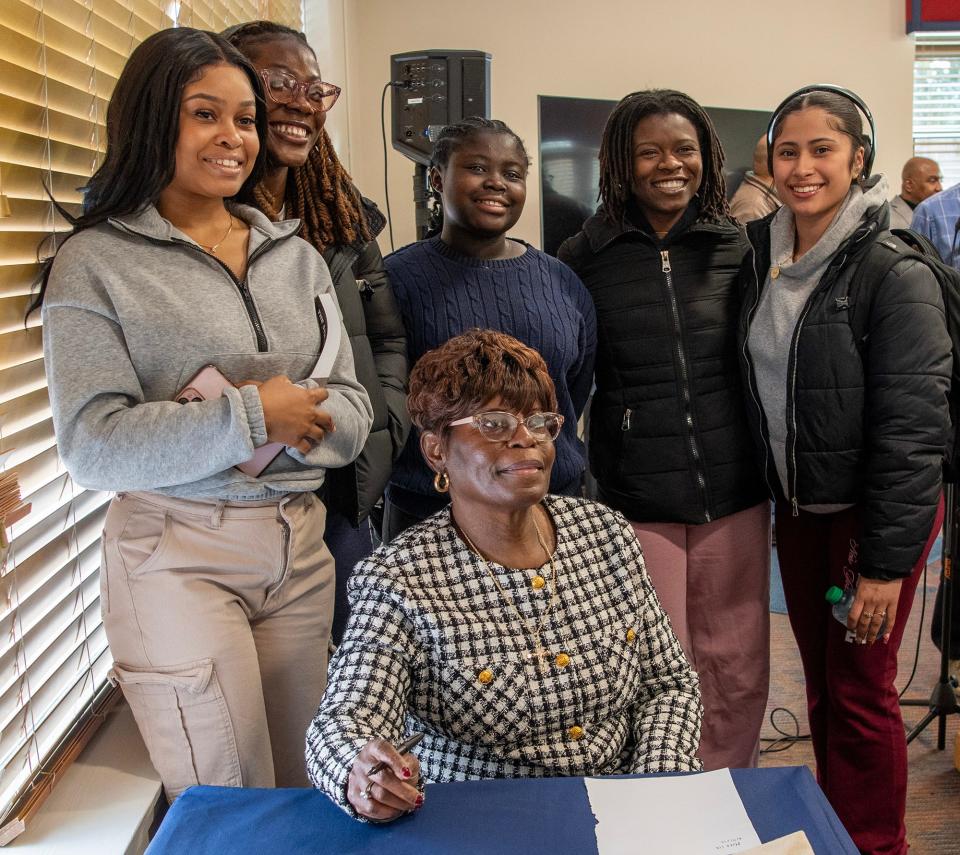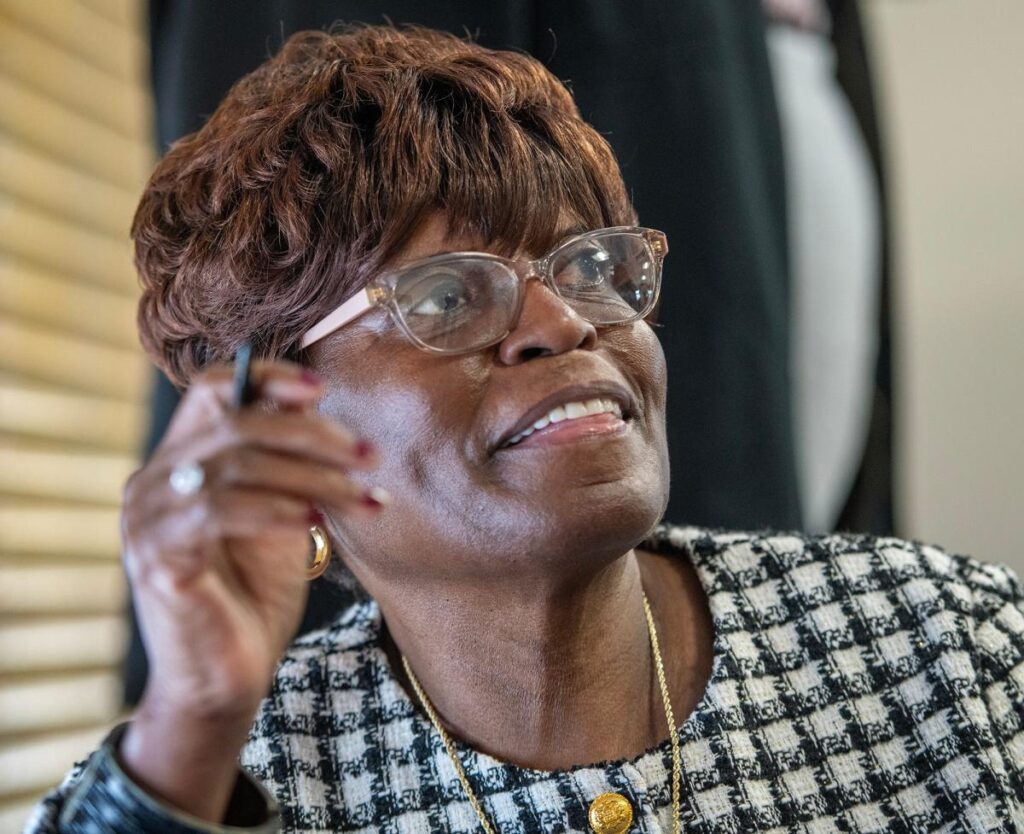PAXTON — Sarah Collins Rudolph did not see the moment her life changed forever. She did not see the crater in the floor of the 16th Street Baptist Church in Birmingham, Alabama, where she was getting ready for church on the morning of Sept. 15, 1963. She did not see the hole blown out of the back wall of the church — and she did not see the bodies of the four girls including her sister Addie Mae Collins, who were so utterly destroyed by the explosion that one of the girls could only be identified by a ring she was wearing.
Rudolph didn’t see any of this — she was blinded by over 20 pieces of broken glass cutting into her eyes, which left her in the hospital for months. Rudolph eventually regained vision in one eye after multiple surgeries.
“When I got to the hospital, I asked where Addie was and I was told she was hurt up bad, but she was going to visit me tomorrow,” Rudolph said. “When I came back from surgery, my mother told me that all of the girls were dead. All I could think about was why they would want to kill little girls? I wanted to cry, but I couldn’t because my eyes were filled with glass.”
Sarah Collins Rudolph signs books after speaking at Anna Maria College in Paxton Monday. Rudolph is the only survivor of the 1963 bombing of the 16th Street Baptist Church in Birmingham, Alabama.
Rudolph is the only surviving victim of the 16th Street Baptist Church bombing, one of the most infamous moments of domestic terrorism in United States’ history and a landmark tragedy of the civil rights movement. Now a motivational speaker, Rudolph visited Anna Maria College Monday afternoon to speak as part of the college’s Black History Month programming.
“Sarah Collins Rudolph is not just a witness to history, she is a part of it,” Sherman Cowan, chief diversity officer at Anna Maria, said. “Sarah’s story does not end with that horrific event. Despite the trauma, physical pain and injustice of never receiving proper restitution or even an apology, she chose to speak out, tell her story and honor the lives of those who were lost, and to remind us all of the devastating impact of hate and the urgent need for justice.”
Rudolph was 12 years old when she sat in the basement of the 16th Street Baptist Church, alongside her 14-year-old sister Addie, and Cynthia Wesley (14), Carole Robertson (14) and Carol Denise McNair (11).
“We had no idea what we were headed into that day. We had just gone downstairs to freshen up before church,” Rudolph said.
Birmingham at center of the civil rights movement then
“Growing up, the entire city was segregated. When we went to try on shoes at the shoe store, we had to wrap pieces of paper around our feet because Black people were not allowed to try on shoes in the store.”
Sarah Collins Rudolph, only surviving victim of 16th Street Baptist Church bombing in Alabama in 1963
Birmingham had been at the center of the civil rights movement for a number of years. Earlier in 1963, the city had been home to a major protest where hundreds of Black residents were arrested while protesting for their right to vote. The city had gained national notoriety for its enforcement of segregation, led by Public Safety Commissioner Eugene “Bull” Connor and Alabama Gov. George Wallace.
“Growing up, the entire city was segregated. When we went to try on shoes at the shoe store, we had to wrap pieces of paper around our feet because Black people were not allowed to try on shoes in the store,” Rudolph said.

Sarah Collins Rudolph speaks at Anna Maria College in Paxton Monday. Rudolph is the only survivor of the 1963 bombing of the 16th Street Baptist Church in Birmingham, Alabama.
The 16th Street Baptist Church had become a meeting place for civil rights organizations in the city, with Martin Luther King Jr., as well as other prominent activists from the Baptist community such as Ralph Abernathy and Fred Shuttlesworth, frequently using the church as a meeting place.
Bombings in the city of Black houses and public gathering spaces was common in Birmingham. The Washington Post reported that there were at least 21 separate incidents where Black-owned properties were bombed in the city in the eight years prior to the 16th Street Baptist Church bombing.
‘A Walking Miracle’
When Rudolph speaks, she does not use the energized rhetoric of a college professor or the passionate fury of a practiced minister. Instead, she talks in a very easy, comfortable style, ripped straight out of her hometown of Birmingham, where she still lives today. She credits her faith in God for allowing her to survive that awful day.
“By the grace of God I am here today, a walking miracle,” Rudolph said.
In the aftermath of the bombing, Rudolph was able to finish high school and attempted to ignore the trauma that had been inflicted on her by the bombing, while her family sought to seek justice for her sister.
For Rudolph, that justice was delayed. Despite the fact that the FBI had identified four known Ku Klux Klan members, Thomas Edwin Blanton Jr., Herman Frank Cash, Robert Edward Chambliss and Bobby Frank Cherry by 1965 as the primary perpetrators of the bombing, there were no convictions until 1977, when Chambliss was convicted of first-degree murder.
Blanton and Cherry would be convicted and sentenced to life imprisonment in 2001 and 2002, respectively, while Cash died in 1994 and was never tried for his alleged involvement.

A group of Anna Maria College students is photographed with guest speaker Sarah Collins Rudolph Monday. Rudolph is the only survivor of the 1963 bombing of the 16th Street Baptist Church in Birmingham, Alabama.
“It took such a long time to bring these men to justice and I was angry for a long time because the City of Birmingham knew who they were. Bob Chambliss’ daughter said that he would brag at the dinner table about how he blew up four (N-words),” Rudolph said.
Rudolph said that despite the lack of immediate justice, she has been able to forgive the perpetrators for what they did and credits her faith for allowing her to move on with her life.
“I just had this angry look on my face, all the time, and people would ask me what was wrong and I would say that, ‘I just look like this,'” Rudolph said. “I knew that in my heart, I had to forgive those men for what they had done because I couldn’t go around being so angry all the time.”
Rudolph, 74, now spends her time crisscrossing the country and telling her story, alongside her husband, George and sharing her story. She recently published a book, “The Fifth Little Girl” about her experience which is available for purchase.
When asked about living during a time that saw civil rights gained and the recent policies by President Donald Trump that have drawn criticism for rolling back civil rights, Rudolph said she is frustrated but optimistic about the future.
“They are trying to take our rights back. We’ve got someone in office right now, I don’t want to even say his name, but I want to tell all of you, we are not going back,” Rudolph said.
This article originally appeared on Telegram & Gazette: Birmingham church-bombing survivor speaks at Anna Maria
Read the full article here
